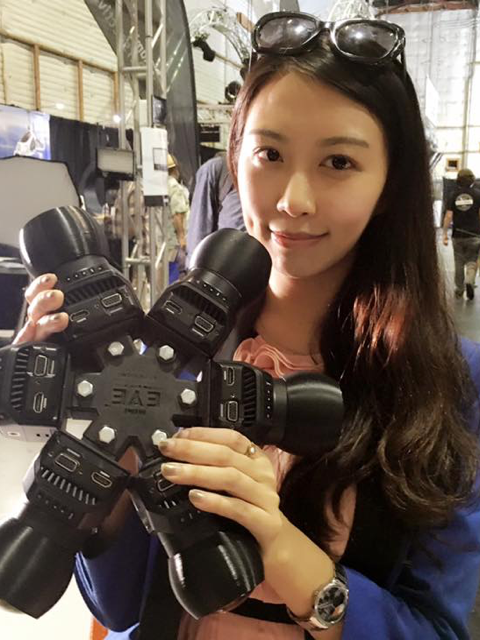by Dorina Marlen Heller
When the train silently approached the station at La Ciotat, the audience broke into a panic. People screamed, running for their lives, fearing that the train would come straight at them, bursting from its screen.
This is the story of one of the first-ever film screenings, showing the arrival of a train in a minute-long, silent reel from 1896.
The human responses conjured by the first black-and-white motion pictures back then remind us of contemporary consumers’ reaction to virtual reality now. And Jenny Guo wants to be a trailblazer like the producers of that historic 1896 video.
“I want to do it because it’s never been done. I want to be a pioneer,” she said.
Jenny is co-founder and CEO of LumièreVR, a company she named after pioneer filmmakers Auguste and Louis Lumiére, the French brothers also responsible for the footage of the arriving train.
In 2016, just a year after it was founded, LumièreVR was named as one of the top 10 VR businesses in China 2016. The company is based in the US, but operates globally. Jenny herself is a Chinese citizen, she moved to U.S. by herself when she was 15 to attend high-school and later college and has been commuting between China and the States ever since.
“Jenny Guo is awesome, delightful and has very high emotional intelligence,” said Tim Draper, CEO of Draper University where Jenny took classes and eventually got her MBA from. At this point she was already deeply involved with virtual reality and founding her own company.
Virtual reality creates a realistic and immersive simulation of a three-dimensional 360-degree environment by using special headsets. The user can also interact within the generated space by movement of the body. To many people, virtual reality is “the next big thing,” a dangling promise of success and wealth, as many tech websites and gurus claim.
“When I got into VR I didn’t think about the money or the business,” Jenny said. “I care about story-telling and that is the core of VR.”
Talking about virtual reality causes something in her face to light up; her gestures become wider and bolder.
“When talking to Jenny about her passion and dreams for VR you forget that she is a recent graduate. Her maturity, sharpness and acumen about the industry are compelling and persuasive. I look forward to her VR creations one day,” said her friend Max, a current Schwarzman scholar at Tsinghua.

Virtual reality as a new way to understand other people’s world
At her company, the team focuses on creating immersive content, mediating between the art and technology industries. They are consulting and collaborating with studios, mainly in the entertainment sector. So far, VR has been widely used in the video game industry, a scene dominated by white men, as Jenny found.
“We want to bring more women to this medium and more and more women get involved with VR lately,” she said.
The first VR productions were almost all first-person shooter games, the 26-year-old CEO remembers. But the way women tell stories is different, more detail-oriented, slower-paced and more focused on back-stories and humans. Jenny believes that including their perspectives allows the industry to become healthier and more diverse.
“VR is a new way to understand other people’s world,” said Jenny.
She has many friends who are talented people but struggle with mental illnesses or have a hard time expressing themselves. She finds that virtual reality can let us see the world from their perspective and become more empathetic as a result. Whether it is about showing people who cope with autism or mental illnesses, taking us to war zones or dealing with the issues of consent and sexual violence – one is instantly attached to the situation, becoming the main actor, rather than just a viewer.
“You can change how people feel about each other,” she explained. “And that is the fundamental reason why I want to do VR.” Of course, that is seeing virtual reality through a very bright lens. “It’s a very powerful tool and could also be very harmful to humans,” Jenny added. It is therefore important to have an ongoing discussion on the ethics in this field, she is convinced.
“Jenny has always been the innovator among us. She is never afraid to explore new technical and artistic territories. Willing to dive deeply into VR at a stage where it was still quite unknown to most of us, Jenny has built her company from scratch and done a great job developing it to what it is today,” said Yuxin Huang, a film director who met Jenny in college and they have worked together on various film projects. “Immensely intelligent, hardworking and always willing to lend a hand to those in need of help, Jenny has always been a role model for me, and I look up to her and cherish her advice. She is really the best!”
Sexism and the tech industry
Sexism and discrimination is one of the problems female entrepreneurs have to face, especially in the tech-environment. Jenny has many stories to tell. Her friends were told in a meeting with venture capitalists that they would not invest in them because they were women entrepreneurs. A guy texted her “You’ll never get married,” when word leaked that she got into Columbia University. In China she often hears: “You’re a girl. You shouldn’t be too hard on yourself.”

Jenny feels that especially in China, many women don’t speak out about the discrimination they face in their respective fields. Although China has numerous female entrepreneurs, many of them are in the lifestyle or fashion industry, which is more acceptable for women since it is “girls’ stuff.”
When asked how she deals with the sexism in her working environment, she smiles resignedly. “I think about it, but not too much,” she said. “If you do, you get hurt and then you can’t focus on your work anymore. But it affects me that there are men that don’t respect me, especially in tech, just because I’m a girl.”
She also finds it hard to confront men about their discriminating behavior without harming her business, since in many instances she is forced to work with them.
Sacrifices and tough choices
When asked about what tips she has for other young entrepreneurs, she first pauses. “I don’t think everyone should run a start-up,” she said. “That is a false ideology society gives us, especially in China. It is not for everyone; you should really think before getting into it and you will have to sacrifice a lot.”

Jenny sacrificed her education when she dropped out of Columbia to start her own company. She sacrificed a high-paying job as an art dealer, spending time with her parents and her cat, which she simply doesn’t have time for anymore because she commutes between China and the U.S.
Still she advised young entrepreneurs, “follow your passion; don’t follow people or people’s reactions.”

Jenny has also faced criticism from within her family. Her dad was initially very much against her getting into VR. “You can’t put on a headset and think that you’re doing virtual reality,” he told her. He only changed his mind when she started getting prestigious invitations to give talks on her work.
Even though she had to make some tough choices, Jenny feels that everything has turned out well. Her cat now lives in Beijing with her parents. Its name is Lumi, like her company, like the two pioneers who lived over a hundred years ago, because that’s why she got into this business in the first place: to be a pioneer.

